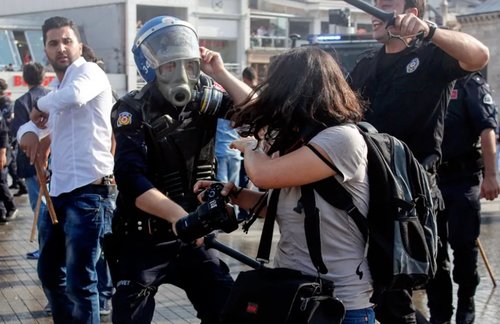The Dicle Fırat Journalist Association (DFG) has shared the findings of its “Journalism within four walls” report with the public.
Documenting the violations of rights against press workers in Turkey, the report was presented at a press conference at the association office in Diyarbakır earlier today (March 28). During the press conference, the documentary of “Journalism in a Tunnel of Horror” was also screened.
The obstacles to freedom of thought and expression, the empire of fear that has been established and the problems faced by journalists in Turkey were expressed by witnesses in the documentary.
The meeting was held by DFG Co-Chairs Serdar Altan and Dicle Müftüoğlu as well as the director of the documentary, Ensar Özdemir.
‘Violations increased after 2016’
The report has shared the following findings and observations about the pressure on the press in Turkey in the recent period:
“In the 21st century, some positive steps were expected in Turkey in terms of freedom of thought and expression and freedom of the press, but unfortunately this did not happen. During the 20-year rule of the Justice and Development Party (AKP), which came to power in 2002, freedom of thought and expression deteriorated gradually.
“While there was a mild process in the Kurdish issue and freedoms during the first 10 years of AKP rule, the repressive state regime gained a new dimension in the second half of the rule. Journalists and media organs have also taken their share from this fascist ecosystem.
“In particular, the events following the military coup allegedly carried out by the Fethullah Gülen cult in 2016 brought about a process that turned the human rights and legal system in the country upside down.
“With the declaration of a state of emergency (OHAL) following the coup attempt, human rights violations increased rapidly.
“With the decree-laws (known widely as ‘KHK’ in Turkish) issued overnight on the basis of the state of emergency, many opposition institutions, organizations, foundations, associations and outlets in the country were shut down, even some universities and educational institutions were closed as hundreds of academics were dismissed.
“Tens of thousands of people were arrested and jailed Thousands of people were tortured under police custody or in prisons. Rallies, demonstrations and democratic protests were banned and the voice of civil society was silenced. The government has tried to limit people’s access to information through the increasing control of internet and social media.
The state of emergency, which lacks legal security and has been used as an authoritarian tool of pressure against dissidents in society has led to abuses and grave violations of human rights in terms of freedom of opinion and expression, especially freedom of the press through the means of decree-laws.
Shutdown institutions
“Following the state of emergency declared on July 20, 2016, 12 decree-laws were issued. A total of 177 media outlets were shut down under Decrees No. 668, 675, and 677 among all 12 decree-laws.
“The closure of 121 media organs, which are not only those known as the ones close to Gulen movement, but also those media outlets who have been close to Kurdish circles and opponents of the government left nearly 2,500 journalists and media workers unemployed.
“Under the guidance of the AKP government, which advocates a monist mindset in Turkey, a new media network was created to replace the media organs and media houses that were closed by the state of emergency. These broadcasters, known as ‘pool media,’ supposed to make propaganda for the government, are also used as a weapon against opposition groups and become a tool to smear, discredit, and target the opposition.
“Hundreds of journalists have had their press credentials taken away, because they did not work in pro-government media organs whilst attempts have been made to make those journalists completely dysfunctional. The number of press cards canceled in the last six years is around 4,000. In addition, journalists who apply for a press card at the Presidency’s Directorate of Communications are not able to get one for various reasons.
“The state of emergency, declared in 2016 and extended seven times for three months, ended on July 17, 2018, but its practices did not end. We are faced with an undeclared state of emergency, especially in the field of media; today, this fascist approach continues and journalists are considered dangerous subjects. All is considered permissible for journalists, from arrests and detentions to threats and attacks.
“The dose of repression has been increased so much that it is almost impossible for journalists to work in the field.
Censorship
“Countless obstacles and difficulties are put in front of journalists who pick up a microphone or a camera to follow the news. All means are used to try to get journalists off the field. Any journalist who crosses the line set by the government finds no opportunity to work comfortably.
“Journalists who are not welcomed by the state-run or pro-government media outlets are either prevented from following the news on the field or threatened with imprisonment if they continue to report from the field. Journalists can sometimes be subjected to interference even before they start shooting a democratic event.
“This is a basic portrait of how journalists in Turkey are targeted.
“In addition, censorship and broadcast blocking have become almost ordinary practices. Hundreds of websites are censored and banned because of the content they publish. Thousands of social media accounts are closed and censored because of the pressure put on their related organizations. Hundreds of people who post on their social media accounts are investigated, charged, and prosecuted.
“With the recent law, social media organizations have been mandated to have representatives in Turkey, and organizations that do not comply are subject to heavy monetary fines.
“Again, the Radio and Television Supreme Council (RTÜK) stands like the “sword of Damocles” atop the media organs.
“The opposition media outlets, the numbers of which does not exceed the number of fingers of both hands, have already been completely eliminated by the government’s operational initiative and have been subject to pressure by the RTÜK and their voices have been silenced. It is a well-known fact that attempts are being made to economically neutralize newspapers that do not behave like the government’s own media through the Presidency’s Communications Directorate and the Public Advertising Agency (BIK), which is the main body to impose censor on media organs in Turkey.
The state of the Kurdish press
In fact, when evaluating press freedom in Turkey, it would make sense to open a separate heading for Kurdish journalists and the Free Press tradition. This is because, as in all areas, the Kurds in Turkey are facing serious problems in the press and media, and the pressure on Kurdish journalists is increasing. Kurdish journalists who work to bring to public attention the violations of right experienced during the ongoing conflict in the Kurdish region of Turkey (namely the eastern and southeastern Turkey) are detained, arrested, threatened, investigated, prosecuted and punished for their journalistic activities.
“Although the state of emergency declared in 2016 was presented to the public as an application for the Fethullah Gülen community, it was the Free Press that was most affected by the state of emergency.
“All television stations, radios, agencies, newspapers, magazines, websites and local media organs broadcasting in our region were shut down. This practice was meant to make Kurds unable to breathe.
“Kurdish journalists make up a significant portion of the jailed journalists. Many Kurdish journalists had to migrate abroad due to numerous investigations and cases against them.”
Statistics from the year 2021
Noting that there are 65 press laborers behind bars in the country as of January 2022, the report has shared the following data from 2021:
1- Violations of right to life and safety against journalists
-
- Journalists 55
-
- Media organs 2
-
- Journalists killed 2
-
- Journalists whose homes were raided 9
-
- Journalist arrested 61
-
- Journalists jailed 6
-
- Journalists who were subjected to torture and inhuman treatment 23
-
- Impositions on journalists to become a state informant 11
-
- Journalists who were blocked from reporting 103 incidents
-
- Violations of rights in prisons against jailed journalists 17
2- Violations of freedom of thought and expression against journalists
-
- Journalists who were started a prosecution against 54
-
- Journalists who were sued 51
-
- Journalists who were charged Number of people 47
-
- Prison sentence 133 years, 8 months, 21 days
-
- Fine 72.206 TRY
-
- Journalists with ongoing trials Number of hearings 336
-
- Number of jailed journalists (as of January 4, 2022) 62
3- Violations of the economic/social rights of journalists
-
- Journalists sacked 75
-
- Journalists whose press cards revoked 1
4- Ban and censorship on press and media organizations
-
- Media organs fined 12
-
- Fines 59
-
- Newspapers fined for advertisement tax
-
- Newspapers 4
-
- Number of days fined 115
-
- Publication ban 112
5- Bans on accessing Internet/digital media
-
- Websites banned 64
-
- News articles banned 1460
-
- Social media content banned 160
(HA/SD)
Source:Bianet
***Show us some LOVE by sharing it!***



